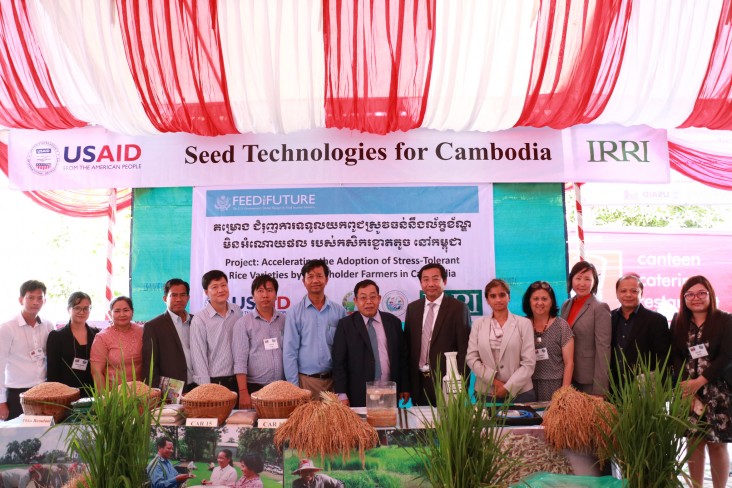Speeches Shim

(as prepared for delivery)
- Your Excellency, Orm Kimsea, Secretary of State, Ministry of Agriculture Forestry and Fisheries
- Your Excellency, Ngo Bunthan, Rector of Royal University of Agriculture
- Distinguished guests, ladies and gentlemen
Thank you for the chance to speak here at the First International Conference on Sustainable Agricultural Intensification and Nutrition. I am delighted to be here with participants from 15 different countries. I want to thank the Center of Excellence for Sustainable Agricultural Intensification and Nutrition, otherwise known as CE SAIN and Royal University of Agriculture for hosting this event.
It is more critical than ever to bring the best minds together to tackle the world’s most pressing problems. Challenges like the increasing demand for food production, the long term risks of environmental degradation, and rapidly shifting social dynamics continue to pose complex challenges to feeding the world’s population.
I am not an agriculture expert like most of you gathered today. We have a lot to learn from you. One reason USAID Cambodia is supporting this conference is that Sustainable Intensification is a production method that improves resource efficiency and enhances farms productivity without harming our land and water supplies. In addition, Sustainable Intensification has the potential to increase the production of safe foods while improving the resiliency of smallholder farmers by promoting climate smart technologies and diversifying incomes.
USAID is very proud of our partnership with the Royal University of Agriculture. We have partnered to create the Center of Excellence and CE SAIN, and through its technology parks, demonstrates many of the Sustainable Intensification technologies as well as other Feed the Future Innovation Lab technologies. This is a place where researchers, agriculture trainers, and the private sector can boost Cambodia’s agriculture sector. I want to encourage those of you who have projects here in Cambodia to demonstrate your research in the technology parks.
It has been nearly 15 years since RUA and U.S. faculty members started working together. This effort has resulted in research for better integrated pest management, post-harvest handling, improved animal source food production, and better ways to produce rice, vegetables and fish. Our partnership has improved food security and nutrition for Cambodian farmers and their families. That is why we want to see an even stronger RUA as well as other Cambodian universities.
I also would like to congratulate RUA not just for lab or classroom research, but for getting out to the field to make a real difference in Cambodian farmers’ lives. Many farmers today are making more money from selling vegetables by implementing technologies that you have developed and promoted. For example, integrated farming and pest management research has increased farmer incomes by between $150 and $200 per year. This added income lets them buy books and clothes for their children, provides medical care, and lets them reinvest in their farms.
I am thrilled that you will visit CE SAIN Technology Parks in Kampong Thom and Siem Reap where you will see the technologies developed by various Innovation Labs. In addition, you will see how high school students learn about agricultural research and begin to build professional careers in agriculture. Cambodia has a very young population and if it is to continue to prosper, its youth need more training to enter the job market and to turn their ideas into reality. To do this, we need modern classes and course content that give young people the tools they need to innovate and advance an evolving agricultural sector. CE SAIN does this by giving high school students scholarships to pursue higher education at RUA so that – one day – they can give back to their provinces.
This two-day conference is not only an opportunity to learn about the great breadth of research conducted here at RUA and CE SAIN, but also from all of you who come from different continents, climates, and agricultural systems. We hope that the discussions, presentations, and field visits will help you understand how you can incorporate sustainable intensification technologies to improve food security, especially for small farmers.
Thank you all for being here. We are committed to working with you and supporting your efforts to strengthen the agricultural sector, food security and nutrition. I am proud of what we have accomplished together in the past, and I look forward to accomplishing much more in the future.
Related Speeches
- Remarks by Menglim Kim, Project Management Specialist, USAID/Cambodia, USAID Greening Prey Lang Final Youth Debate
- Remarks by Ms. Hanh Nguyen, Deputy Mission Director USAID/Cambodia, Health Professional Councils’ Strategic Planning Orientation Workshop
- Remarks by John Eyres, Director, Office of Public Health and Education, USAID/Cambodia, Dissemination Workshop of the Fifth National Strategic Plan for a Comprehensive & Multi-sectoral Response to HIV & AIDS in Cambodia

Comment
Make a general inquiry or suggest an improvement.